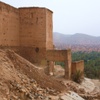Disclaimer
This entry contains information known to us from a variety of sources but may not include all the information currently available. Please be in touch if you notice any inadvertent mistakes in our presentation or have additional knowledge or sources to share. Thank you.
Archive
Oasis of "Below the Jews" at Tioute, Morocco
Legend has it that this oasis derives its name from the nomadic Jews who once roamed the mountains above. Some of these Jews may have settled in the nearby date farming village of Tioute, whose mellah (Jewish Quarter) now lies in rubble. The tomb of the Hacham of Tioute, a saint, is also nearby.
Description
Tioute Located in southern Morocco, Tioute is a community of roughly 2,800 people. The village is surrounded by farms, both subsistence (growing mostly dates) and commercial (with cash crops such as oranges, bananas, and maize). Nearby in the Anti Atlas mountains, a beautiful kasbah sits at the top of one of the smallest mountains. A painted staircase leads down the mountain to the village; halfway down the staircase, a short path leads to the tomb of a local saint, the Hacham of Tioute.
Morocco By the late 1200s, the Jews of Morocco gained the ruling Berber dynasty's permission to openly practice Judaism. Morocco became a haven for Jews fleeing persecution in Spain; as many as twenty thousand Jews arrived in Morocco in 1492 after being expelled from Spain. By the seventeenth century, Jews lived in more than 250 communities in Morocco; Jewish traders were everywhere in the countryside, providing a connection between the costal cities and the smaller communities of the Sahara. During Spain's occupation of Tetouan in the early 1860s, many Jews fled from port cities to the countryside or even to Algeria. When the Crémiuex Decree of 1870 granted French citizenship to Algerian Jews, many Moroccan Jews settled in Algeria. At the beginning of the twentieth century, Morocco had the largest Jewish population of any Arab country, numbering between 110,000 and 120,000 people (about 2.5 percent of the population) in 1912. The population reached a peak of around 250,000 in the 1950s. Morocco gained independence in 1956, and a series of governmental decisions (including partially nationalizing the Alliance Israélite Universelle schools and temporarily forbidding postal relatiosn with Israel) made many Jews eager to emigrate. Once emigration policies were relaxed in 1962, more than 130,000 Jews left Morocco over the next thirty years, usually settling in Canada, France, or other Western European countries. Today, Morocco's Jewish population is less than five thousand people, most of whom live in Casablanca.
Sources
Hatimi, Mohammed. Encyclopedia of Jews in the Islamic World. "Morocco." Brill Online, 2014. Accessed July 18, 2014. http://0-referenceworks.brillonline.com.luna.wellesley.edu/entries/encyclopedia-of-jews-in-the-islamic-world/morocco-COM_0015720
Naturally Morocco. "Tiout Oasis Souss Plain and the Anti Atlas Mountains." Accessed July 18, 2014. http://www.naturallymorocco.co.uk/destinations/taroudant/taroudant-excursions-2/tiout-oasis-and-the-anti-atlas-mountains-1.html
Silver, Chris. "Hacham Tioute - Oct 31." Jewish Morocco. November 7, 2008. Accessed July 18, 2014. http://jewishmorocco.blogspot.com/2008/11/hacham-tioute-oct-31.html
![Below the Jews Oasis, Platform With Tombstone [2] (Tioute, Morocco, 2010)](https://cdn.filestackcontent.com/aUuftgPSSJKKIt2jQ6bz/convert?w=100&h=100&fit=crop)
![Below the Jews Oasis, Platform With Tombstone [1] (Tioute, Morocco, 2010)](https://cdn.filestackcontent.com/w2wYr2VTYasqcYBphm7R/convert?w=100&h=100&fit=crop)
![Below the Jews Oasis, Platform With Tombstone [3] (Tioute, Morocco, 2010)](https://cdn.filestackcontent.com/dpw52sclTEuwOKOzuKr6/convert?w=100&h=100&fit=crop)
![Below the Jews Oasis, Platform [1] (Tioute, Morocco, 2010)](https://cdn.filestackcontent.com/SgD1LWaAQIqCP9CwGSLL/convert?w=100&h=100&fit=crop)

![Below the Jews Oasis, Distant View [3] (Tioute, Morocco, 2010)](https://cdn.filestackcontent.com/GiozOXfQei3qsn8yTrUV/convert?w=100&h=100&fit=crop)


![Below the Jews Oasis, Distant View [2] (Tioute, Morocco, 2010)](https://cdn.filestackcontent.com/Es9c0PLOQt6PlR8zoAKv/convert?w=100&h=100&fit=crop)
![Below the Jews Oasis, Distant View [1] (Tioute, Morocco, 2010)](https://cdn.filestackcontent.com/AhNKRHnaSyC91LNNRVyO/convert?w=100&h=100&fit=crop)